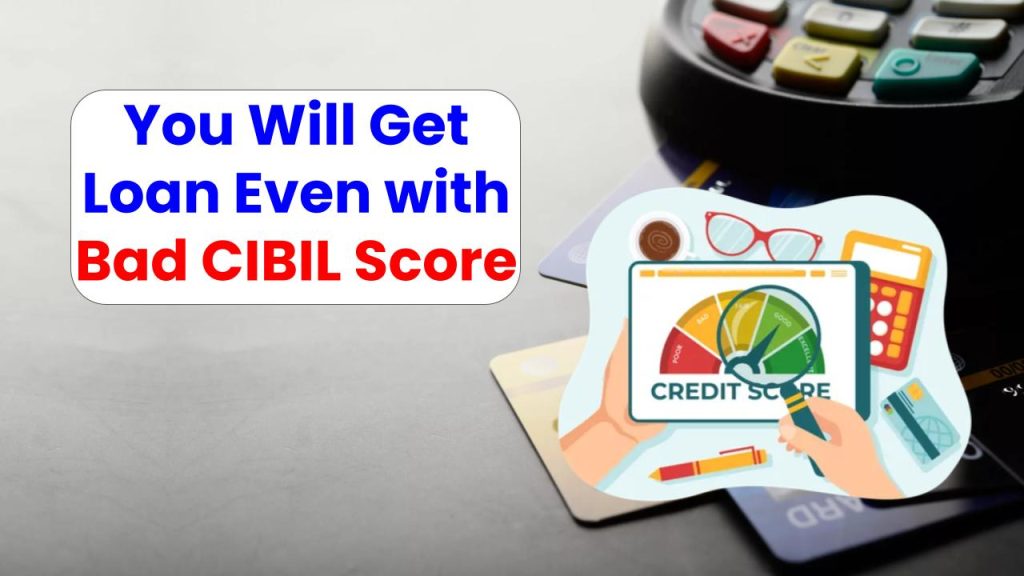
When you apply for a loan, one of the first things banks and lenders check is your CIBIL score. But what if your score isn’t great? Can you still get a loan? The answer is yes! You can get a loan even with a bad CIBIL score—you just need to be aware of certain strategies and steps to improve your chances.
In this guide, we’ll break down how you can secure a loan despite a low credit score, what lenders really look at, and how you can take control of the situation. Whether you’re a beginner or a finance professional, this guide covers actionable advice, facts, and clear examples to help you out.
You Will Get Loan Even with Bad CIBIL Score
| Key Details | Information |
|---|---|
| What is a Bad CIBIL Score? | Typically, a score below 650 is considered bad |
| Loan Approval with Low CIBIL Score | Possible with stable income, collateral, or guarantor |
| Alternative Loan Options | Secured loans, peer-to-peer lending, NBFCs |
| Improvement Tips | Timely payments, low credit utilization, co-applicant |
Getting a loan with a bad CIBIL score is absolutely possible—you just need to know the right steps. Focus on showing your income stability, offer collateral, or rope in a co-applicant. Meanwhile, work to improve your CIBIL score for future financial health.
What is a CIBIL Score and Why Does It Matter?
Your CIBIL score, ranging from 300 to 900, is like a financial report card. It tells lenders how reliable you are at repaying debts. Usually, 750+ is considered good, while anything below 650 raises red flags.
However, banks don’t make decisions based only on the score. They consider your income, existing debts, and repayment capacity too. So, if your score is low, you still have a fighting chance—if you play smart.
Why Your CIBIL Score May Be Low
Before diving into solutions, let’s understand why scores drop:
- Missed EMI or credit card payments
- High credit card utilization (using too much of your limit)
- Too many loan/credit card applications in a short time
- Defaulting on loans
- Errors in your credit report
Knowing what caused your low score helps you fix it and prevent further damage.
see also: Kisan Vikas Patra Scheme Account: Money Will Be Doubled Directly
Can You Get a Loan with Bad CIBIL Score? Yes, Here’s How!
Even if you have a score under 650, lenders may approve your loan if you:
1. Show Strong Income Proof
Lenders want assurance you can repay the loan. If your salary or business income is steady and well-documented, they may overlook the low score.
Example: If you earn ₹70,000/month and can demonstrate consistent income for the past year, your lender might approve despite a score of 600.
2. Opt for a Secured Loan
Secured loans require collateral like property, gold, or fixed deposits. Because lenders can recover money through the asset, they’re more lenient about your CIBIL score.
- Examples of secured loans: Gold loans, home loans, car loans.
3. Apply with a Co-Applicant or Guarantor
A trusted person with a high credit score can co-sign your loan. Their financial strength compensates for your low score.
4. Approach NBFCs or Digital Lenders
Non-Banking Financial Companies (NBFCs) and Peer-to-Peer (P2P) lending platforms are less strict about CIBIL scores compared to banks. But be careful—they may charge higher interest rates.
5. Provide Extra Documentation
Income tax returns, salary slips, existing asset documents, and employment proofs can strengthen your application. Lenders may focus more on these than the score.
Pro Tips to Improve Your Loan Approval Chances
Let’s add some actionable, professional-level advice:
Maintain Low Debt-to-Income Ratio
If your total EMIs are less than 30%-40% of your income, lenders feel safer approving your loan—even with a bad score.
Request Smaller Loan Amounts
Lenders are more willing to take a risk if you apply for a smaller loan. Start with smaller amounts and repay them timely to build credibility.
Offer Higher Down Payment
Putting down a larger upfront amount lowers the lender’s risk, increasing the chance of approval.
How to Improve Your CIBIL Score for Future Loans
While you may still get a loan with a bad score, it’s smart to improve your credit health. Here’s a step-by-step action plan:
1. Pay EMIs & Credit Card Bills on Time
Your payment history accounts for about 35% of your credit score. Set auto-debits to avoid delays.
2. Keep Credit Utilization Below 30%
If your card limit is ₹1,00,000, use no more than ₹30,000 at any point.
3. Limit Credit Inquiries
Every time you apply for credit, an inquiry is recorded. Multiple inquiries in a short period hurt your score.
4. Check Your CIBIL Report Regularly
Errors like wrong personal info or fraudulent entries can drag down your score. Download your report at CIBIL’s official website and report any discrepancies.
5. Diversify Credit Types
Having a mix of credit cards, personal loans, and secured loans reflects positively on your profile.
Other Loan Options for Low CIBIL Scores
Here are a few alternatives worth exploring:
1. Gold Loans
Easier to get, as they are secured by your gold jewelry or assets. Interest rates are lower, and CIBIL score isn’t a major factor.
2. Loan Against Fixed Deposits
Banks can lend up to 90% of your FD amount. It’s quick and credit score requirements are minimal.
3. Peer-to-Peer Lending
These platforms connect borrowers directly to individual lenders. They assess your profile beyond credit score—like profession, income, etc.
see also: You Can Get a Return of ₹2 Lakh on Depositing ₹2,800 in This Government Scheme
Get Loan Even with Bad CIBIL Score FAQs
Q. What is considered a bad CIBIL score?
A score below 650 is considered bad by most lenders.
Q. Can I get a personal loan with a 600 CIBIL score?
Yes, especially if you apply with a co-applicant, opt for secured loans, or approach NBFCs and digital lenders.
Q. Does checking my own credit report lower my CIBIL score?
No. Soft inquiries like checking your report yourself do NOT impact your score.
Q. How long does it take to improve a low CIBIL score?
With consistent efforts like timely payments and low utilization, improvement can be seen in 3 to 6 months.
Q. Will a rejected loan application hurt my CIBIL score?
The rejection itself doesn’t hurt the score, but the hard inquiry made by the lender slightly affects it. Multiple applications in a short time may reduce it.











